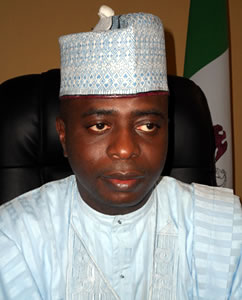SERAP indicts 55 politicians, others of stealing N1. 354trn in 7 years

A new report issued by the Socio-Economic Rights and Accountability Project (SERAP), in a new report entitled “Letting the Big Fish Swim’’ has indicted “55 politicians, high-level public officials and leaders of allegedly stealing N1, 354tr between 2006 and 2013 from the nation’s treasury”.
According to the report, “The amount of money embezzled, misappropriated or stolen by public officials and leaders in the private between 2013 and 2017 has galloped beyond the contemplation of average Nigerians. Evidence abound that Judges, judicial officers, lawyers and military officers are participants in the frenzy of despoliation of national wealth.”
The 112 pages report launched on Wednesday, in Ikeja, Lagos, presented to journalists by Dr. Esa Onoja, Senior Lecturer of Law, Litigation and Professional Ethics at the Nigerian Law School, Abuja Campus disclosed that “While the main anti-corruption agencies secured more than 1500 non-high profile convictions between 2000-2017, they could only muster 10 high profile convictions between the periods.”
“In the investigation, prosecution and trial of high profile corruption cases in Nigeria, justice is imprisoned by snares contrived by actors in the legal community in aid of looters,” it stated.
It contained “high profile cases of corruption prosecuted by anti-corruption agencies between 2000 and 2017 as numbering 177 out of which 167 are pending. Total convictions are just 10. Out of the 10, only 3 convictions were obtained after full trial while 7 convictions were based on plea bargaining. Yet 1 of the 3 convictions based on Full trial was discharged by the Supreme Court while 3 of the 7 convicted were granted Presidential pardon.”
The report launch chaired by Oladayo Olaide, Deputy Director Macarthur Foundation had in attendance human rights lawyer Femi Falana SAN; Barrister Babatunde Ogala; Mrs Juliet Ibekaku- Special Assistant to the President on anti-corruption and Coordinator of the Open Partnership Government; Chinedu Nwagu, Trust Africa; Mr Joy Esezebor, Ford Foundation; David Ukagwu Head, DFID South-West Regional Coordinator; Wahab Shittu; former NBA Chairman, Lagos Mr Martin Ogunleye; Miss Jennifer Ogbechi representing Mrs. Mariam Uwais; Mr Collins Okeke, representing Dr. Olisa Agbakoba; the media, civil society groups and representatives of anticorruption agencies.
All the participants expressed commitment to ensure the full implementation of the recommendations contained in the report.
The report read in part: “Most corruption cases against high profile defendants witness delays tactics and tricks by defendants to truncate fair trial. The cases depict the stark reality of a captive justice system at the mercy of high profile offenders and their platoon of defence counsel. The negligible number of conviction of high profile defendants explains the probable calculus of offenders that the risk of apprehension and conviction is low.”
“The sense of simmering undercurrent of commodification of justice and commercialized legal contortions and reasoning pervades investigation, prosecution and trial of high profile corruption cases in Nigeria. Justice stands in the dock this game of musical chairs presided by technical justice while high profile offenders gleefully sit in comfort with their loot, fortified by the efficacy of a vast array of subterfuge and jiggery-pokery of their lawyers, with seeming active and passive connivance of actors in the legal community.”
Responding, Falana said, “Nigerians should stop rubishing all judges and lawyers. No doubt there are a few corrupt judges and lawyers. Just a few. But majority of members of the legal profession are not corrupt. Our duty as concerned citizens is to identify and isolate the bad judges and lawyers.”
Falana’s remarks read in part: “With the abolition of stay of proceedings politically exposed persons and their lawyers are no longer permitted to frustrate their prosecution. In commending SERAP for producing this report let me say that the areas covered are a tip of the iceberg. Not a single reference was made to the most corrupt institutions in the country.”







